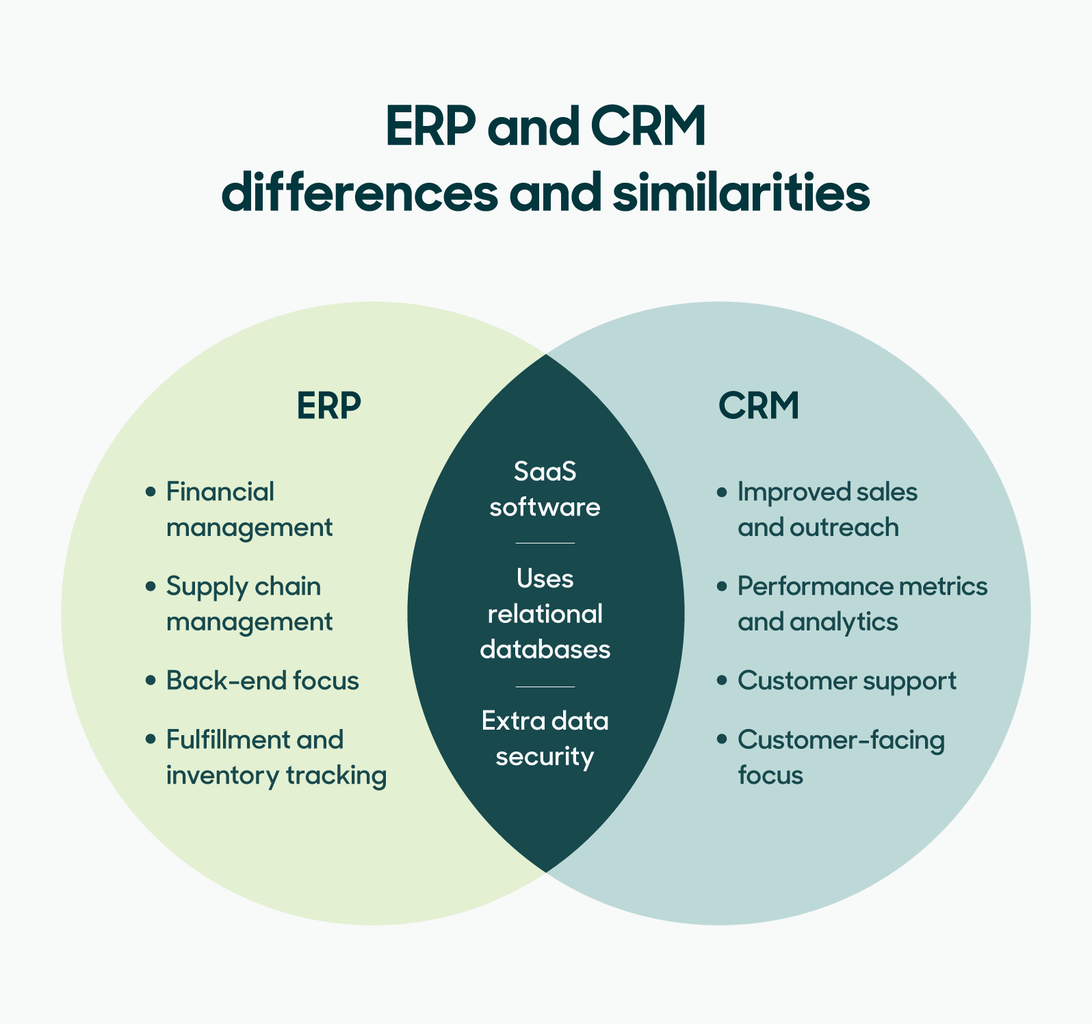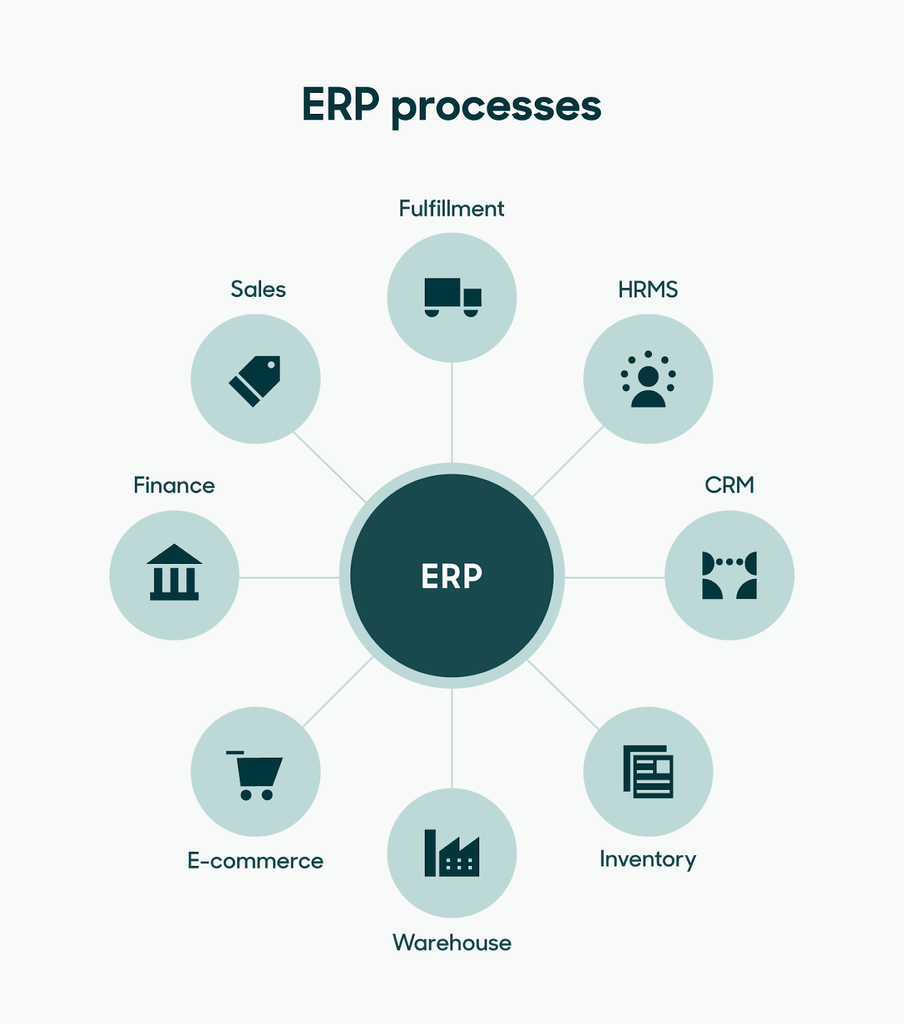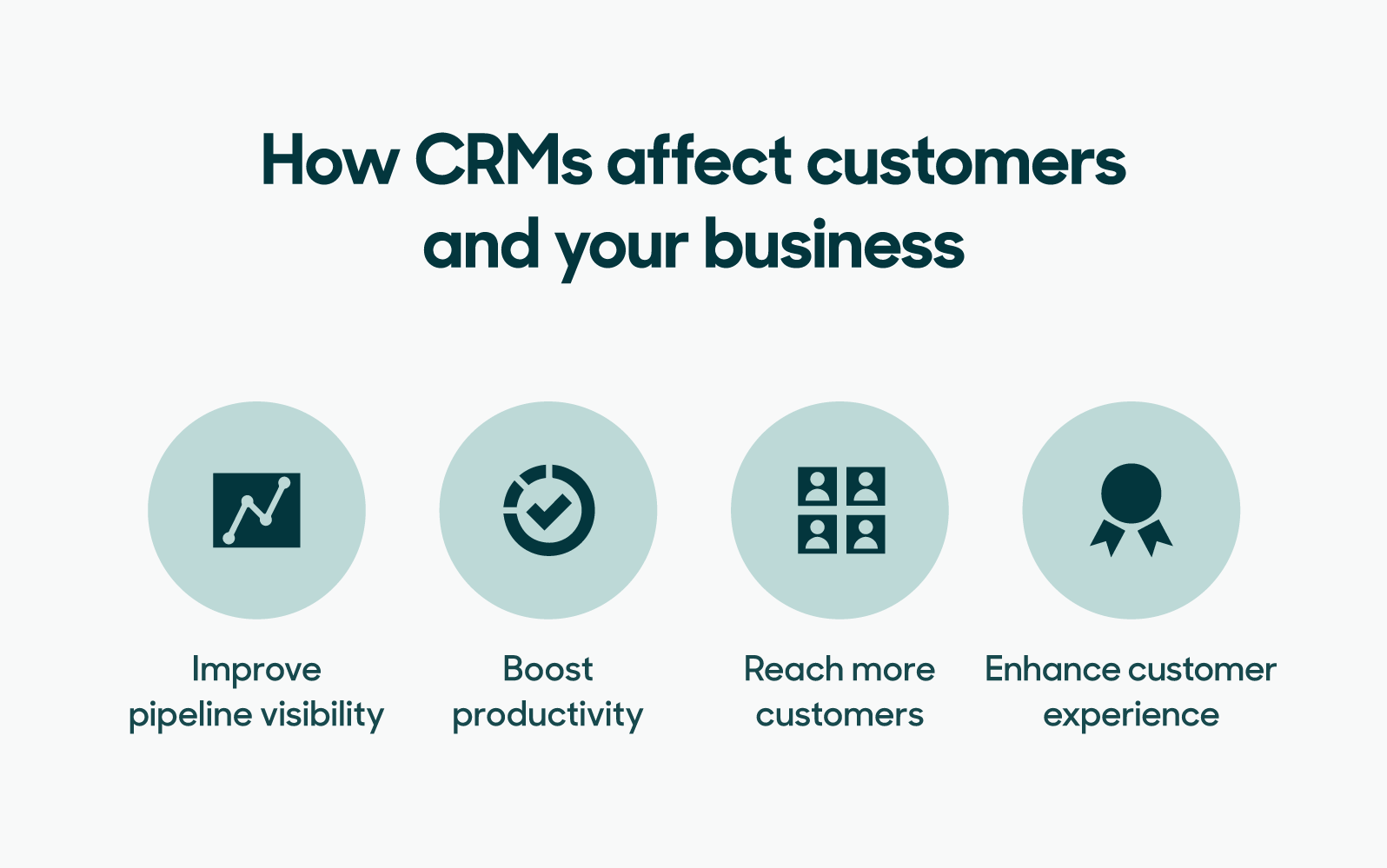
Enterprise resource planning (ERP) and customer relationship management (CRM) software automate business processes and boost your return on investment (ROI). ERPs manage day-to-day operations that affect your entire business, streamlining or automating core processes. CRMs collect data on the customer-facing side, assisting with sales and customer support services.
The ERP software market is expected to reach $78.41 billion by 2026, while the global CRM market could reach $96.5 billion by 2028. In today’s market, tech solutions aren’t luxuries: They’re necessary tools to stay competitive. By learning the basics of ERP and CRM systems and how they can integrate, you will exponentially improve productivity.
What’s the difference between an ERP and a CRM?
Both CRMs and ERPs aim to improve a company’s performance—ERP systems focus on the organization as a whole, and CRM software focuses on the consumer-facing side of your business.
- ERPs let organizations manage their core operations. Managers can automate and oversee daily activities involving accounting, project management, supply chain procedures, risk management, and compliance.
- CRMs improve relationships between a company and its clients. CRMs streamline sales and customer service processes to improve the customer experience and increase profits.
Key ERP and CRM software similarities
All ERP and CRM systems streamline operations and create better communication, efficiency, and accuracy throughout your company. They do this by storing and analyzing data in one system. They’re both:
- More secure than processes that spread data across various communication platforms
- Easy to use, as they’re packaged within an accessible software as a service (SaaS) model
- Time-saving tools when it comes to data collection and reporting
- Accurate in generating reports on everything from finances to sales metrics

ERP and CRM features
ERPs and CRMs offer an extensive list of use cases. For a breakdown of each software’s main features, check out the table below:
|
ERP |
CRM |
|---|---|
|
Accounting and financial management |
Complete customer view |
|
Supply chain management |
Sales productivity tools |
|
Procurement management |
Performance metrics |
|
Production management |
Bulk outreach tools |
|
Inventory management |
Customizable smart lists, templates, and sequences |
ERP software helps with finances (such as accounting and payroll), order processing, tracking manufacturing and supply chains, inventory management, and more. Some ERPs even have customer management and support capabilities. Rather than using multiple systems, companies can use one ERP’s enhanced reporting capabilities to see a snapshot of the entire business.
CRM systems help with front-end processes. CRM software benefits include creating customer profiles, automating marketing campaigns, building out self-service resources (like chatbots and help centers), and tracking sales. CRMs also make it easy to sync customer-facing teams, including sales, marketing, and support.
What is an ERP?
An ERP collects information from various departments and stores it in a centralized database. The tool can capture data on:
- Accounting
- Manufacturing
- Marketing
- Sales
- Supply chains
- Human resources
As a result, teams can share data and collaborate more easily, leading to an improvement in internal operations. That level of visibility spotlights inefficient processes as well as opportunities for synchronization, such as automating repetitive tasks. Overall, this increased efficiency saves businesses time and money.

What is a CRM?
CRM systems gather information about customer interactions with a company and compile that data in a centralized database.
CRM software manages customer data for sales and customer service purposes. It is a key part of a CRM strategy, which companies deploy to better manage their relationships with prospects and customers. Businesses will use a variety of applications as part of their CRM strategy.

ERP vs. CRM: Which one is right for your business?
The high-level distinction between ERPs and CRMs is clear: ERPs focus on back-end processes, and CRMs focus on front-end processes and customer management. While they have many similarities, the systems work best in their intended departments.
If you want to use your online CRM to look at finances and budgeting regarding inventory, it won’t work as well as an ERP. You’ll get further than you would with no sales software, but an ERP will perform better. Similarly, you won’t get the best client profiles and buyer persona breakdowns out of an ERP.
If you’d like to cover all your bases, integrating the two is always a great option to explore. If you’re only looking to integrate one or the other, making that decision depends on your business model, scale, and unique operations.
When to use an ERP
Looking for a one-stop solution for balancing employees, customers, and inventory? The full-service functionality of an ERP system may be just what you need.
Consider using an ERP system if:
- You want to improve back-end processes. ERP software (and ERP integration) can help you streamline hiring, accounting, supply chain management, and more to make your operations more efficient.
- Your business is growing rapidly in all areas. A robust ERP solution can help you overcome growing pains and keep everyone on track by synthesizing key data and aligning departments.
- You’re using numerous tools or tech services. Using multiple solutions can get confusing and costly. An ERP system lets you consolidate the information you need in one database.
According to Terillium, an ERP consulting company, industries that benefit from ERP systems are manufacturing, professional services, distribution, construction, and healthcare. Whether large or small, these types of businesses all have complex operations and processes. An ERP is essential for keeping all departments aligned.
When to use a CRM
When a company is just starting out, a simple spreadsheet may be enough to keep customer information organized. But as the business grows, it will need a more robust system for managing customer data and keeping it accessible to employees. That’s where a CRM system comes in.
Consider using a CRM tool if:
- Your customer relationships are complex. Although some ERPs have limited customer management capabilities, they’re often not as robust as CRM software features. A dedicated CRM system will help you handle a large customer base and focus on valuable long-term accounts.
- Sticky notes and spreadsheets will only get you so far. When it comes to organizing customer data, a CRM is often a great place to start, especially for businesses that don’t need additional back-end features. This is because a CRM generally costs less and is easier to onboard than an ERP.
- You aren’t looking to launch any new products in the foreseeable future. ERPs are fantastic on the production side, but if you’re looking to push existing products, CRMs are far more useful for marketing tactics and customer experiences.
Any business that deals with customers can benefit from a CRM system. Here at Zendesk, we see a variety of industries embracing different types of CRM tools. Hotels, retailers, banks, and real estate companies are some of the most common CRM users. Still, many other industries also use this tool.
Questions to ask yourself
Before investing in one type of software or the other, ask yourself:
- What’s my core business model? If your ROI depends on attracting and retaining customers, a CRM can help you right out of the gate. An ERP makes more sense if you focus on managing resources or assets.
- Do I need help growing my business or managing that growth? CRMs will attract new customers, but ERPs will streamline operations as you assist them.
- How much do I want my company to grow? The larger a business becomes, the more an ERP will help manage various processes.
- How soon do I need to implement the software? CRMs are easier to install than ERPs and offer immediate benefits.
- What’s my company’s biggest weakness? Software can do more than capitalize on a business’ strengths; it can also compensate for weaknesses. Use one system or the other to improve front- or back-end processe
Integrate your ERP and CRM for the best results
ERPs and CRMs have traditionally remained separate, even when companies rely on both. But at Zendesk, we recommend CRM and ERP integration to give everyone the best of both worlds. All departments will get a real-time view of crucial data surrounding customers, financials, inventory, pricing, and more.
Say someone from the accounting team (who uses the ERP) or someone from the customer service department (who relies on the CRM) updates a customer account. If the two systems are integrated, there’s no need for manual updates because both tools are pulling from the same database.
Request a demo of our CRM and ERP tools today, and experience how integration can drastically improve your organization’s efficiency, profitability, and customer satisfaction.